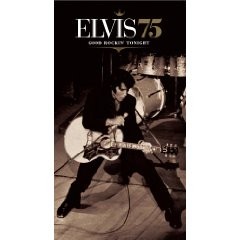
Unless you're the type who attends candlelight vigils at Graceland, this is all the Elvis you'll ever need: Good Rockin' Tonight, four CDs, 100 songs that range from his first self-financed demo “My Happiness” from 1953 to Presley's final live and home recordings shortly before his death on a toilet seat on Aug. 16, 1977. The deluxe package, with the requisite booklet, has been released in conjunction with the 75th anniversary of Presley's birth.
I feel compelled to say up front that, as a child of the Beatles, I always took in Presley from a certain remove, more in admiration of his contributions than a genuine love for his music. That hasn't changed after close scrutiny of Good Rockin' Tonight, but my overall appreciation of him as an artist, and especially as a singer, has increased.
It hardly needs to be said, but Disc 1 is the prize here. It contains all of Presley's Sun singles and the best of his RCA sides: “That's All Right,” “Good Rockin' Tonight,” “Mystery Train,” “Heartbreak Hotel,” “Hound Dog,” “Don't Be Cruel,” “Love Me Tender,” “All Shook Up,” “Jailhouse Rock” and the rest. (The latter contains what I presume is an unintentional slice of homoerotica: “Number 47 said to Number 3 / You're the cutest jailbird I ever did see/ I sure would be delighted with your company/ Come on and do the jailhouse rock with me.” Hilarious).
]
The subsequent music on Good Rockin' Tonight is more problematic. It shows Presley becoming increasingly commodified. The late 1950s material on the first part of Disc 2 was stockpiled before his conscription into the U.S. Army and apparently the producers had a field day: The first song, “Hard Headed Woman,” your basic rock & roll rave-up, is dressed with Dixieland-ish horns, including swooping trombones that are just silly.
Upon his return from the service in '60, Presley's handlers decided to cast him in a more adult light (anticipating, I presume, that the rock & roll thing was just a fad and that Presley's fans would grow up and start liking Andy Williams). As a result, there's more and more tunes like “It's Now or Never” and “Pocketful of Rainbows.” His gold mine film career spun off a slew of singles, most of them treacle like “King Creole.” During this period, Presley's best singles were ballads, allowing his vulnerability to emerge and his falsetto to flower. “Are You Lonesome Tonight?,” “Crying in the Chapel” and “There's Always Me” have genuine emotional power, while a boogie-rock tune like “I Feel So Bad” comes off as a cynical artist pandering to his “younger demo.”
Disc 3 is in many ways the most intriguing of the four because it chronicles Presley's slum–he became an overnight anachronism when the Beatles burst on the scene, with a song like “Viva Las Vegas” only reaching No. 29 on the pop chart–and his artistic redemption in the late 1960s that ushered in a last blush of credibility. From '64-'69, Presley's recorded work was marked by schmaltz and gimmickry (“Memories,” “Adam and Evil,” “This is My Heaven,” Hawaiian guitars and all).
His descent was reversed in 1969 with a troika of worthy hits, beginning with the topical “In the Ghetto,” followed by pop epics “Suspicious Minds” and “Kentucky Rain.” During this phase, Presley curiously fiddled with a bit of Stax-style soul: “Stranger in My Hometown” pulses along on a legit funk groove, and on Gamble & Huff's “Only the Strong Survive,” the King of Rock 'n' Roll sounds uncannily like Cher.
By the 1970s, Presley had pretty much thrown in the sweaty towel and consigned himself to Vegas, gilded jumpsuits, pills and significant girth. Disc 4 is an odds-and-sods aggregation of live performances, including the over-the-top “American Trilogy” and an ill-advised take on James Taylor's “Steamroller Blues,” as well as country tunes (“Funny How Time Slips Away,” “Always on My Mind”) and unfettered rock & roll.
Presley's best material during this final phase sounds freed from the shackles of hit-making and represents some of his most honest and organic music since the mid 1950s. “I Washed My Hands in Muddy Water” hums along at breakneck pace, spurred by a punchy horns and a snaky harmonica. “Burnin' Love,” his last major hit (1972) could actually qualify as roots-rock. Likewise, “Promised Land,” “T-R-O-U-B-L-E” and “For the Heart” strip away the artifice and let a fading master simply rock out.
If a four-CD boxed set is more Elvis than you need, a single-disc, 25-track spin-off–Elvis 75–should suffice. Anything less simply won't do.

